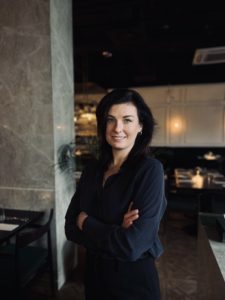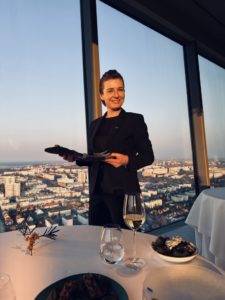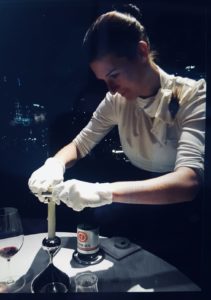S.P.: Ms. Woronowska, thank you so much for  taking the time to speak with us. To start, we’d like to highlight your professional achievements for our readers. Over a decade spent in three-star restaurants around the world, working in renowned establishments like The Fat Duck and the Danish Noma. For many, this represents a professional dream, an unattainable goal, but for you, it’s reality. We can’t help but start with this question: How did it all begin?
taking the time to speak with us. To start, we’d like to highlight your professional achievements for our readers. Over a decade spent in three-star restaurants around the world, working in renowned establishments like The Fat Duck and the Danish Noma. For many, this represents a professional dream, an unattainable goal, but for you, it’s reality. We can’t help but start with this question: How did it all begin?
E.W.: From a young age, I was somewhat involved in gastronomy. My grandmother ran her own “little restaurant” (“knajpa” in Polish – as she called it 😊), so naturally, our family life revolved around what was happening there, around “who, how and when was helping”, around weddings, social gatherings, and other events. My grandmother always said that running restaurants was a tough job and forbade anyone in the family from considering it professionally!
I was convinced I would pursue a completely different field, but when I was about 19 and moved to England, everything changed. I was working in a hotel. One evening, I saw a TV show featuring Heston Blumenthal preparing a dessert with liquid nitrogen – it was bacon and egg ice cream. At that moment, I asked the chef next to me if that was a real restaurant; I only knew Rosette ratings from hotels and knew nothing about Michelin. What’s all this magic about? Dry ice, liquid nitrogen, edible earth, edible houses and wallpapers… These were clips from ‘Heston’s Feasts’.
At that moment, I knew one thing – I had to work there to see if this magic was real and if Bacon and Egg Ice Cream really tasted that good! From that moment until I started working at The Fat Duck was about three months. I applied for a waiter position, and despite lacking experience, I managed the interview. I was determined to see the magic from the inside, and this began many long years and initiated my adventure with Michelin.
S.P.: What were the biggest challenges you faced working in starred restaurants?
E.W.: I think the biggest challenge was the very beginning of this adventure. Not knowing anything about Michelin, I jumped in at the deep end. The Fat Duck was already considered the best restaurant in the world according to the World’s 50 Best Restaurants, 3* Michelin, awarded best restaurant in England, best service, and there I was, not fully understanding what it all entailed. I was the second woman to join the all-male team and the only non-French person. There was one Pole in the sommelier team, but sommelier teams were a different, better team 😊. The language barrier was very difficult for me. During service, the level of stress and adrenaline was extreme, and I didn’t understand most of the words because they were derived from French or were just jargon (I later wrote my bachelor’s thesis on all the borrowings and jargon in starred restaurants worldwide 😊). Additionally, long working hours, dealing with various emotions, and the enormous amount of time needed to acquire the knowledge required to perform my duties were challenges. The distance from loved ones and lack of time to spend with friends were also challenging. But over time, I developed a good routine, and with the knowledge and experience gained, it became easier 😊.
 S.P.: Do you recall any exceptional moments or anecdotes from working in three-star restaurants?
S.P.: Do you recall any exceptional moments or anecdotes from working in three-star restaurants?
E.W.: There are so many. Over 10 years working in starred restaurants is a long story! I remember many moments that I will cherish for the rest of my life, and most of them are quite funny! I remember a service when The Fat Duck was visited by Stephen Hawking. We were so curious about his opinion on the food, and he joked a lot during dinner – at the end, he asked for a photo with the team – it was a special moment!
Another special experience for me was relocating restaurants to other continents. While at Noma, I participated in a pop-up in Tulum, Mexico. It was an incredible project. The restaurant was almost on the beach, service in shorts and flip-flops! We had to maintain the highest service standards while being careful of scorpions, crabs, and other creatures, and also have a “Rain Plan” in case of a storm!
At The Fat Duck, a memorable time was the trip to Australia. We packed up the entire restaurant and transported it to the other side of the globe. It was a very difficult but exciting experience! The restaurant was located in Crown Melbourne. The time we were preparing for the opening coincided with the Australian Open, Formula 1 Melbourne, and cool concerts. During such a challenging preparation for the restaurant opening, we were lucky enough to get tickets to these events!
S.P.: We are now speaking in Poland. We know you have been working in the country for some time. What prompted your return to Poland?
you have been working in the country for some time. What prompted your return to Poland?
E.W.: I traveled a lot. I was ready to find my place on earth. I had the choice to either go to Tokyo after working at Noma and work in another amazing starred restaurant or come to Poland and try something completely new, something that would be a much greater challenge for me! I had never worked in Poland before, so I knew it would be difficult. When a friend offered me a job in Gdańsk, I didn’t hesitate for a moment! I was curious about the level of gastronomy in Poland, but most of all about how the Michelin guide was developing in Poland.
S.P.: What are you currently doing? We heard that you advise restaurants in Poland on improving their service and overall approach to customers.
E.W.: Recently, I’ve finally been doing what I dreamed of while still in Copenhagen, which is working with various restaurants focusing on improving service and standards at a given place. I don’t like the term “consulting” much; I see myself more as someone who joins a team for a longer or shorter period of time, gets to know the team, the level of the restaurant, and proposes solutions, which I then usually implement with the team.
I don’t have one fixed offer for everyone. Every time someone contacts me, I suggest a conversation, a mandatory visit to the place to see how the service runs, sometimes two visits are needed. I observe the service from the inside at the restaurant and then propose a form of collaboration. Sometimes I suggest a one-day training, joint services with the team, or ongoing cooperation with the restaurant involving regular training, active participation in service to show the conveyed knowledge in practice and providing substantive support. I am always available for those I work with, from owners to managers and floor staff. I am committed to approaching each person or place individually with a specially tailored action plan. Some need a revolution, others an explanation of certain standards, and still others need “organizing” their existing skills and knowledge.
S.P.: You have extensive experience working in starred restaurants abroad. Additionally, you worked for two years as a manager at the first Michelin-starred restaurant in Gdańsk, Arco by Paco Perez. Therefore, it’s unavoidable to ask this question: What are the biggest differences between fine dining in Poland and that in the UK and Denmark?
E.W.: I think these differences are becoming smaller because we are developing very quickly. However, fine dining in the UK or Denmark is still something more natural than in Poland. Abroad, the culture of dining out is at a more advanced level than in Poland – I’m talking about the whole country, not just the largest cities, so naturally, people are more inclined to “eat out.” In Poland, many people still believe that to go to a fine dining restaurant, one needs to dress very elegantly and prepare well for it.
Additionally, general restaurant prices scare our guests. Considering the greater availability and variety of products in the UK or Denmark, we in Poland have to pay much more for some of them because the number of suppliers and product availability is still limited, so we pay extra for logistics.
From a completely different perspective, I think about the difference in some employers’ attitudes towards employees. In Poland, restaurateurs often invest in the restaurant building, decorations, and attractions but forget that people are the greatest capital and the face of the place; they create the experience for the guests.
S.P.: What are the most common mistakes made by Polish fine dining restaurants?
E.W.: In my opinion, it’s the lack of a complete concept for the restaurant and sticking to it consistently. In every Michelin-starred restaurant where I worked or interned, one of the first things I learned was the coherent concept and philosophy of the place. This is something I find lacking in Poland.
Additionally, many places lack a common denominator between the head chef, restaurant manager, and investor (if there is one). This causes a lack of understanding and hinders the development of the place. And as I mentioned earlier – the thinking that “if employees are paid, there’s no need to invest in them anymore” is wrong. If a restaurant wants to achieve something exceptional – like a Michelin star – it must be ready to make sacrifices that others are not.
S.P.: As we mentioned earlier in the interview, you currently advise restaurants across the country. In this regard, are Polish restaurants open to innovations and changes suggested by you?
E.W.: Definitely! The people who contact me trust my experience, so even if they initially approach my unconventional approach with skepticism, over time they see that I care primarily about people and an individual approach to the place. Often, someone contacts me with one problem, and after analyzing the situation, it turns out that we need to address something completely different as a priority, which, in turn, resolves all other issues. This can initially be difficult for restaurants to understand.
I have a comprehensive view of the restaurant and the staff. Even if the goal is to “upgrade” the place to a Michelin-starred level, it cannot be achieved without investments in people and their development. Therefore, some changes may be visible only after a longer period.
The first thing I often do is suggest organizing staff meetings and initiating an internal dialogue, which often helps solve many problems and disputes. As a person from the outside, I am not emotionally involved, so I can notice the things that the team often overlooks.
S.P.: What prospects do you see for fine dining restaurants in Poland? Is the Polish market ready for more Michelin-starred restaurants?
E.W.: In my opinion, the industry is developing dynamically, but it seems to me that society is not yet ready for a surge of Michelin stars in Poland. Let’s consider all the professionals in the gastronomy industry. More and more people are returning from abroad with experience working in Michelin-starred establishments. Additionally, people are educating themselves, aiming to be even more professional, undertaking internships, educational trips, and “eating professionally” in starred restaurants to educate themselves, but our guests are only slowly getting used to this.
It seems to me that the perception of Michelin-starred restaurants in Poland is still that they are stiff, that they must have tablecloths, waiters that educate guests, etc. Yet in the UK, there are places where you can walk into a two-star restaurant—a pub—eat a burger with a pint of beer and watch a football game—completely without pretension. At Noma, the front of house used wax or currant branches to make a dishes which were used to serve a Michelin-starred food, which is a completely different approach we need to learn 😊
S.P.: What do you think is the reason that many Polish restaurants impress only through recommendations in the Michelin guide, while some with stars in other countries are considered by many Polish guests to be of a lower level?
E.W.: It seems to me that this might be a misleading statement because restaurants around the world striving for a star operate at higher levels, fighting for that distinction. However, as a country, we are still in the early stages when it comes to the guide. Unfortunately, in Poland, restaurants have to try harder, even prove their capabilities. We are limited by the availability of stars only for selected regions and the low awareness of society. Only relatively recently has there been talk of respect for farmers, products, or food suppliers. We want to present ourselves in the best light and do it as well as possible because that star is the most important reward for our efforts. Abroad, that star is almost within reach. The experience of restaurateurs is at a much higher level, and restaurants are competing with ever-newer concepts. There is much easier access to the highest quality products. For example, in England, there is a huge variety in restaurant styles. Guests are open to, for instance, Michelin-starred bistros with a completely casual style, or pub-restaurants—hence, the thought that our restaurants might be better than foreign ones might arise.
S.P.: What are the biggest challenges facing Polish restaurants striving to earn a Michelin star?
E.W.: In my opinion, the biggest challenge for a restaurant striving for a Michelin star is achieving a stable situation in the dining room. The percentage of chefs who have returned from abroad or gained knowledge in Michelin standards is significantly higher than the percentage of managers or waiters who return to Poland and want to get involved.
Unfortunately, a manager is often in the shadow of the chefs or investors, a hidden hero who takes care of every detail, and is often undervalued. Additionally, maintaining team motivation and work in Poland is a problem, where there is still not as much respect for the work of waiters as there is abroad.
S.P.: Do Polish guests differ from those in Western Europe in terms of expectations and behaviour in fine dining?
E.W.: It seems that guests with fine dining experience from abroad have similar expectations for our local restaurants and are very supportive of us! I know several guests who are regulars at fine dining spots in Poland and also provide significant support to our industry.
Fine dining is often linked with tasting menus. In Poland, though, the culture of enjoying and relaxing with tasting menus is still developing. From my experience, we sometimes need to convince guests that they will be satisfied with the smaller portions typically served in these types of meals. 😊
S.P.: What elements of foreign fine dining standards could be adapted to the Polish market, and which should remain unique to Poland?
E.W.: One element I feel is missing in fine dining restaurants in Poland, and which I would emphasize more, is the freedom in service during the meal. Our focus on perfection often leads to unnecessary stress, which guests can sense. Waiters should express their personalities and build relationships with guests, rather than sticking strictly to learned phrases and a catalogue of ingredients. I believe we need more empathy and a greater focus on meeting guests’ needs.
From the kitchen’s side, I would retain elements of our Polish traditional cuisine and culture for as long as possible. Too often, restaurateurs and restaurants follow trends or imitate well-known figures instead of staying true to themselves and their craft.
S.P.: Do you have any future plans related to the gastronomy industry?
E.W.: Of course! However, I would prefer not to talk about plans but to share interesting projects during their realization 😊
S.P.: One last question, and perhaps the most difficult one. Which Polish restaurant, in your opinion, could have a chance at achieving 3 stars?
E.W.: Indeed, this is the most difficult question! I’ll say this: I wish everyone who dreams of a star the strength and perseverance to achieve 3 stars!
S.P.: Thank you very much.
